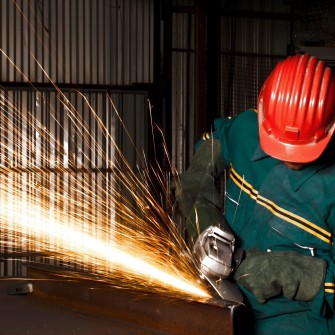Company fined £50,000 for permanent injuries to 21 employees
A manufacturer has been fined after 21 of its employees were left permanently injured after being diagnosed with hand-arm vibration syndrome.
It was not until 2011, when Linde Heavy Truck Division Ltd, Merthyr Tydfil, appointed a new health and safety manager that the company put measures in place to manage the risk of hand-arm vibration syndrome (HAVS), also known as vibration white finger.
A total of 21 employees were diagnosed with HAVS, which was reported to the HSE under the Reporting of Injuries, Diseases and Dangerous Occurrences Regulations 2013.
Employers’ duties to protect employees from the risk of HAVS have been set out for many years, but the company did not implement the necessary measures until a new health and safety manager identified the risks.
Merthyr Tydfil Crown Court heard that the Health and Safety Executive (HSE) had carried out an investigation which revealed there had been no recognition of the risks from hand-arm vibration in the workplace and no management of these risks over many years.
The factory was closed at the end of 2013 and the employees made redundant.
Hand-arm vibration is a hazard for employees in many industries and can occur through the use of handheld power tools, such as grinders, hand-guided machinery, such as lawnmowers, and hand-fed machines, such as pedestal grinders.
Prolonged and regular exposure to this vibration can cause irreversible damage to nerves, blood vessels, soft tissue and bones in the hands.
HAVS causes tingling, numbness, pins and needles and pain the hands of sufferers. People diagnosed with HAVS can also experience difficulty with gripping and holding, doing up buttons, writing and driving.
Some of the workers who were diagnosed with HAVS have said that they are now unsure of future work because of the factory closing down and their condition. One has had to give up riding a motorbike, as it was no longer safe to do so. Another describes their hands becoming “purple and claw like” in cold weather.
HSE inspector, Helen Turner, said: “The employees were exposed to the risk of hand-arm vibration on a daily basis, yet Linde Heavy Truck Division failed to recognise this.
“There was no health surveillance to identify employees who might already have some vibration damage even though they employed ex-miners and experienced fitters, or to pick up whether someone was suffering symptoms before they became serious.
“From 2000, when the factory opened, until its closure in 2013 there was never a fully compliant management system for hand arm vibration and 21 employees have suffered life changing injuries as a result.”
Linde Heavy Truck Division Ltd pleaded guilty to breaching Section 2(1) of the Health and Safety at Work etc Act 1974. The company was fined £50,000 and ordered to pay £14,793.60 in costs.

